I am an American from California, U.S.A. From a very early age, I began to be interested in Chinese culture, and began to dream of one day coming to China. Then in the summer of my 22nd birthday, my dream took flight when I boarded a plane for Beijing, where I have lived for the past 14 years. During these years, I have completed two degrees and found the true love of my life. My wife comes from Ningbo, a city in China’s southeast province of Zhejiang. This year we will celebrate our ninth wedding anniversary. This year is also the ninth time we celebrated Chinese New Year together in her hometown.
Just as everyone knows that they need to hurry up and board the train when the bell begins to ring, when songs with lyrics like “Gongxi gongxi gongxi ni ya” (which means “congratulations to you” in the context of getting rich) or “Gongxi ni facai” (which means wishing you prosperity) begin to sound in super markets and radios across China, everyone knows that Chinese New Year is almost here. This year I have invited every reader here to join us in our family celebrations.
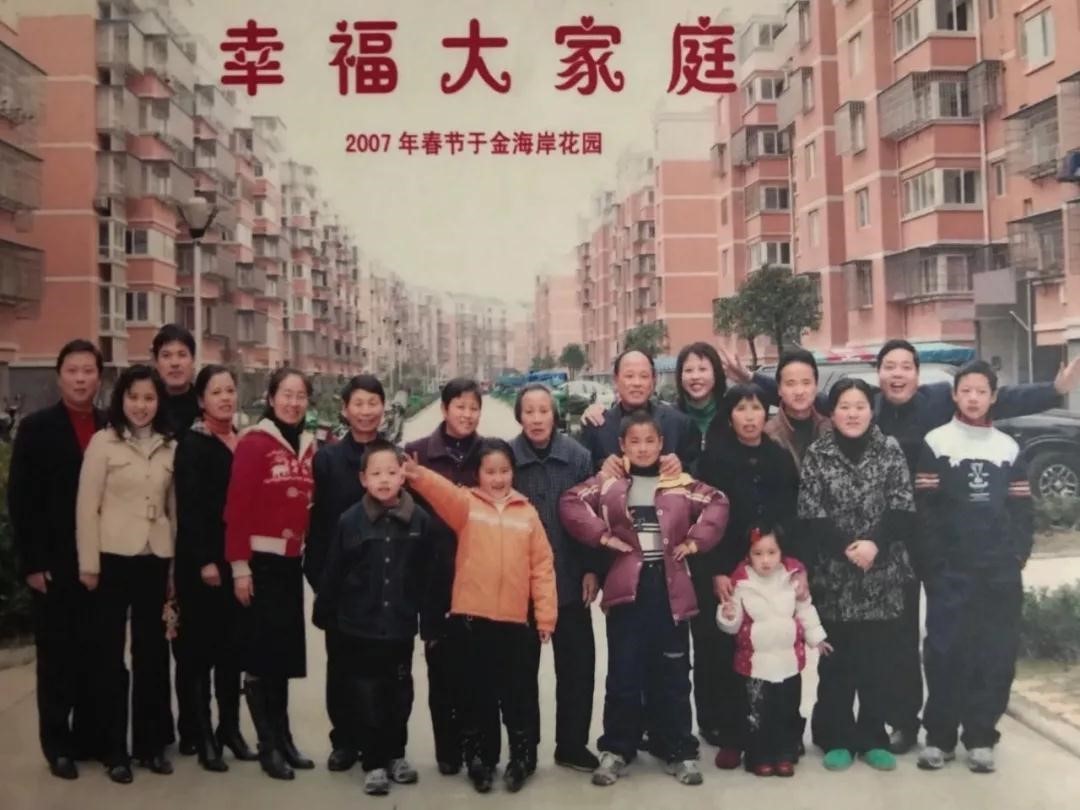
A photo of the author’s wife’s family in 2007
My Second Home: Daxie Island, Ningbo
Our long journey home begins in Beijing and ends in an outlying island off the coast of the port city of Ningbo, Zhejiang Province. The island is called Daxie Island, also known as Ningbo Daxie Development Zone. This island was established as the Ningbo Daxie Development Zone in March 1993, being jointly developed by CITIC and the local government. With an overall area of 30.84 square kilometers, it has a coast line of 26 kilometers, including a deep water coastline section of 10.7 kilometers, making it an ideal location for a port. After many years of development, many multinational and domestic enterprises like Sinopec, Petro China, Wanhua, etc. have set up company offices on the island. Daxie enjoys a humid subtropical monsoon climate with four distinct seasons. Today, the island has become the first development zone in the province of Zhejiang to achieve a revenue of over RMB10 billion. Because of the special geographical features of the island, the local people by and large relied on farming to make a living, growing vegetables, fruits, rice, etc.
To get to Daxie Island from Beijing, our journey takes us first by train to Ningbo East Train Station, then more than an hour of riding the subway east across the city towards the coast. Finally, a half-hour bus ride which finally crosses the Daxie No.1 Bridge takes us to our final destination – Daxie Island. Actually, throughout the last ten years I have taken this long journey with my wife, we have witnessed many changes in China society, including the reduction of our door to door travel time from 20 hours to less than 10 hours.
My First Spring Festival in Daxie Island: Welcomed into the Family
The first time I traveled to Daxie Island to celebrate Chinese New Year in 2010, we rode the only direct train that traveled between Beijing and Ningbo. The difference between the train ride then and the high-speed rail train we ride today is that there were many people everywhere, on the seats, in the aisles, and even sometimes in your own seat if you got up to walk around for even a minute. If you weren't lucky enough to beat the crowds in getting a sleeper, you were destined to enjoy a crowded journey with perfect strangers — but often you were able to make friends with some of them. With the ushering in of the high speed train technology, there are four trains that run back and forth. As a result, you don’t have to share so much time with so many people — and by the way, people are too occupied with their iPads and smart phones to even share any word with you. Today, thanks to technology the way home has become much “shorter.”
The first Chinese Spring Festival that I spent in Daxie Island was the time my wife’s family had decided to hold my wife’s (fiancé at the time) and my engagement reception. Every time we went out of the house in those days, from the neighbors in my in-laws’ apartment, people we passed on the street, to the sellers in the market, there wasn’t anybody who wasn’t curious about who this foreigner was and what had brought him to the island. The answer they got that I was soon to become a family member of a local family always brought big smiles to their faces, and they warmly welcomed me into the community.
During our engagement reception, there were about sixty people in attendance, all of whom were relatives. My concept of family on that day was expanded. In the English language, names of close and distant family members are quite simple. A brother of either parent regardless of age is called “uncle + name”; a sister of either parent regardless of age is all called “aunt + name”. In Chinese on the other hand, the relationship between oneself and each extended family member is clearly shown in name one calls them, from “Bobo” (father’s older brother), “Shushu” (father’s younger brother), “Guma”(father’s older sister), “Gugu” (father’s younger sister), and the list goes on and on from grandparents to cousins on both sides. Well, I not only had to start learning a new list of vocabulary for calling relatives, I had to master it in a dialect. Needless to say, it was quite an unforgettable experience. Soon I was able to master the various family titles and was accepted into the family.
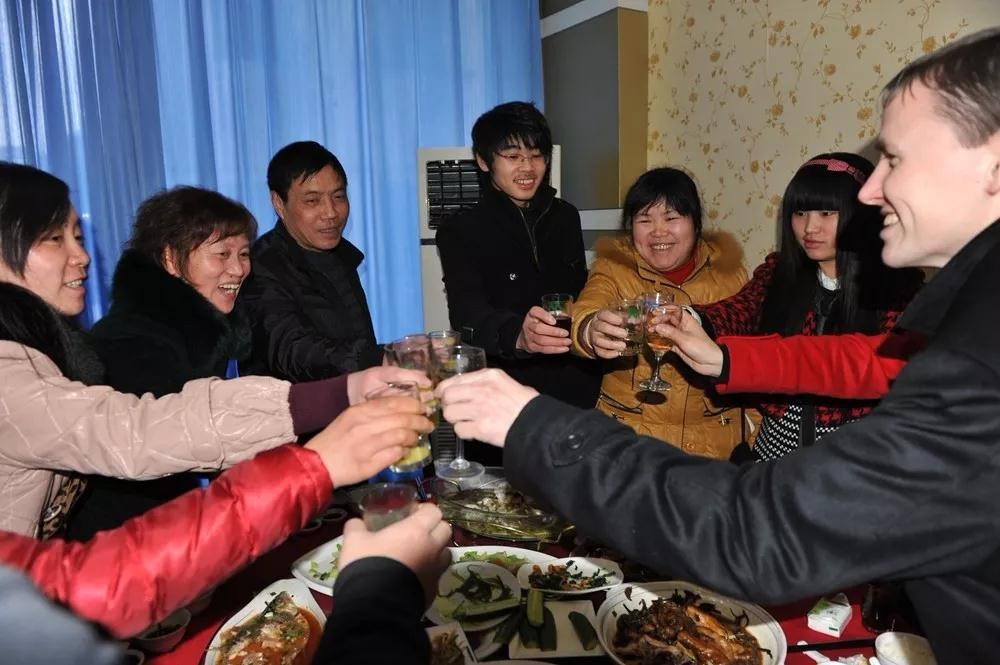
The author celebrates first Spring Festival in his in-laws’ hometown in 2010
Before We Arrived: They Were Already Waiting for Us
This year, after we had just boarded the bus that would take us to Daxie Island, my mother-in-law called and told us that my father-in-law was already waiting at the bus station. When we got to the station, he was there, eagerly awaiting our arrival. Actually every time we return home, he is always waiting at the station eagerly looking forward to our arrival.
After arriving at the home of my in-laws, there was a surprise awaiting us. To welcome us home, my in-laws always purchase some special kind of food that they don’t usually eat during the rest of the year. This year’s special food was a large, whole, ripe jack fruit, bought for over RMB300 — this is the power of love for a son-in-law. Last year the “fatted calf” was an expensive durian, this year was a jack fruit — who knows what it will be next year.
Buying Things Beforehand: A Social Event
After the major development of Daxie Island began in 1993, the majority of people who lived in various villages spread across the island were all moved into a couple major central areas. Today when you go out for a walk in the market or around town, you will always run into some acquaintance from the village they used to live in or relative, even more so during the shopping time before Spring Festival. This Spring Festival I observed this phenomenon play out in a very interesting way.
Customs carried out during the New Year’s Eve in this fast changing island environment vary from family to family. Some people enjoy their New Year’s dinner a couple days before the Lunar New Year’s eve so they can go travel during the vacation, while others eat it on the New Year ’s Eve.
On the eve of the Lunar New Year, after eating supper, my family went out for walk around the island. Parks and open areas were full of middle-aged people dancing together, while younger people and young families enjoy lighting firecrackers. In our own apartment complex, we also saw a family conducting a ceremony which included lighting candles and offering gifts of food to request blessings for the new year. Regardless of what everyone is busy with, the majority of people will usually make their way home in time to watch the Spring Festival Gala. Every year at 8:00 o’clock sharp, my wife and I will watch the Gala with my in-laws — the feeling of knowing that you are watching a TV program with millions of people across the world at one time is quite unique.
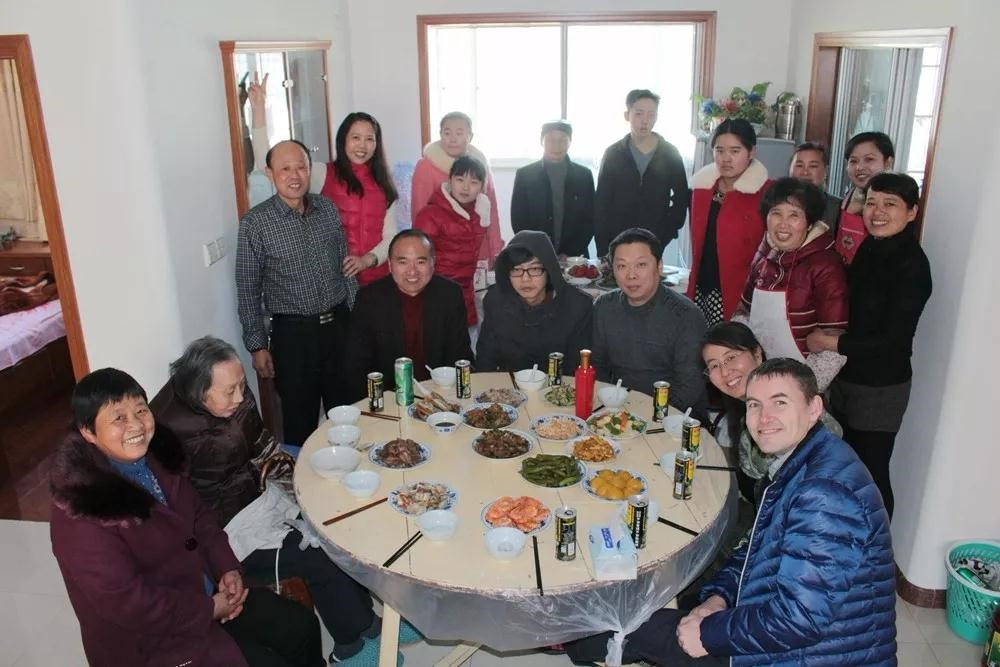
A family photo of the author with his Chinese family in 2015
Food and Eating: Never a Personal Affair
As with every other cultural festival in China, there is always special delicious food to eat and much of it during the Chinese Spring Festival. Here on Daxie Island, the featured food during Spring Festival includes: rice cake,rice dumpling,boiled glutinous rice balls in fermented glutinous rice, as well as various kinds of sea food like shrimp, crabs clams, and other sea foods (some of which I have never seen or heard of before). People during this time, also eat all other types of meat, like, pork, mutton, rabbit etc., and every year we always see such meat served in abundance at the meals we have at my wife’s uncle and cousin’s home.
In addition to the delicious food, the event of eating is never a personal matter. During the many years of celebrating Chinese New Year with my in-laws and relatives, I have realized the accepted amount and content of what a son-in-law or family guest for that matter, is allowed to eat is not something they can decide by themselves. Parents and the host of the family you are visiting will do their best to make sure that you get as much as possible during the meal. If you stay at the table after you are full, your empty bowl will be filled; if you try and eat less, they will do their best to encourage you to eat more—of course I came to understand with time that this is traditional Chinese hospitality. Parents and relatives sole desire is to make sure you know that there is far more food than you can eat.
At home, it took me time to adjust to and adapt to the overwhelming and all-encompassing warmth which my in-laws treated me with. During meals, food was always heaped into my bowl, and there was no excuse I could find to convince them to give me less – they didn’t understand that when I said, “I am full”, I meant what I said. I think I must have put on several kilos of weight during the first several New Year celebrations. One key to balance respect to in-laws and relatives as well as trying not to eat too much, is to keep your bowl full with something even after you feel full, because if you empty it, it will certainly be filled. With time, we have learned to understand each other and get along well.
Visiting Family: Learning to Communicate in a Dialect
Our family keeps the cultural tradition of visiting family members during Spring Festival. On the morning of the first day of the Chinese New Year, my mother in-law always gets up early to prepare breakfast and get ready to go out and visit her elder brother’s family. At his home, all her family usually gathers to celebrate the first major meal together of the New Year. Family members include relatives who return every year from Hangzhou, relatives who live in Beijing (us), and close family relatives who life on the island. Every year the environment of the first meal of the year with family is very lively and special.
Communication with many family members here is always a challenge since I don’t understand the local dialect. I remember when I first stepped off the bus on Daxie Island, I felt as if I had entered a foreign country, because everyone here spoke a dialect I didn’t understand. When communicating with family, many try to practice their not often spoken Mandarin, while the other elderly relatives are not able to speak or distinguish between what is dialect and Mandarin. In those moments, we share many smiles and nod our heads at each other.
Up until a couple of years ago when my wife’s grandmother was still alive, she would always try to communicate with me regardless of our language barrier. Sitting on the sofa after lunch, she would always call me over to talk to with her. In the beginning my wife would interpret for her from dialect into Mandarin, but the more she talked, the more energetic she became. In the end, my wife couldn’t keep up with her talking speed. Her warm heart and care crossed the borders of culture and language that stood between us. Each spring festival, I will try to learn some of the local dialect, and through chatting with my in-laws and other relatives, it is always interesting to learn a little more about the family history, the big changes of this island from what it was like before and after the establishment of New China, then to the reform and opening-up, and becoming a development zone in the early 90’s.
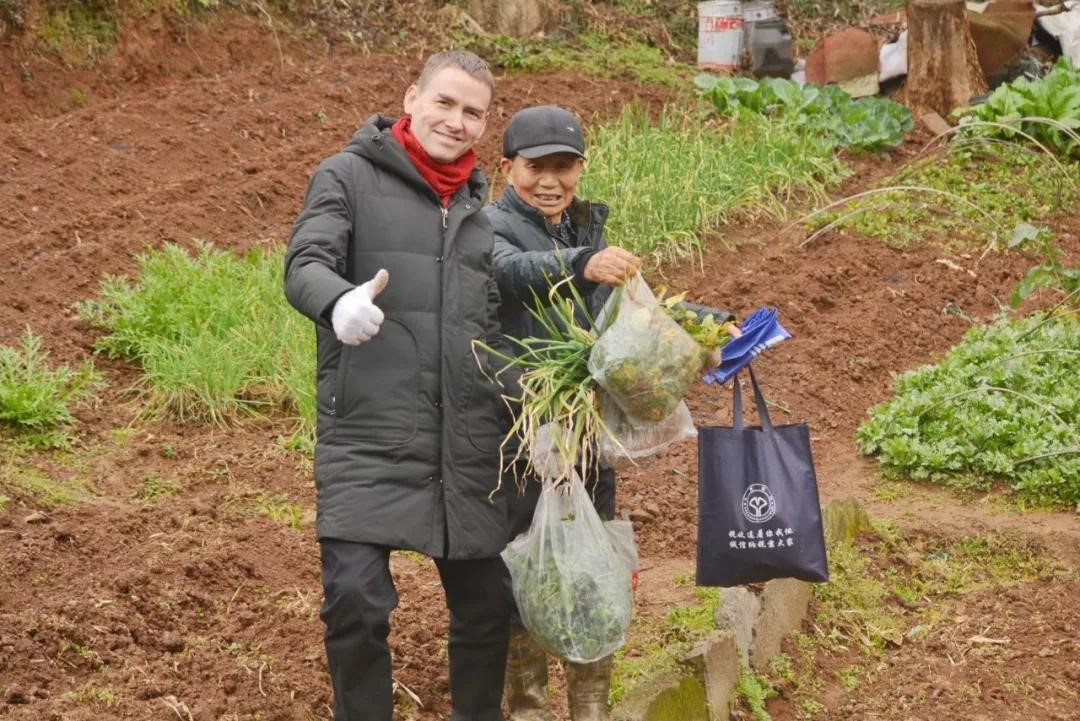
The author helping his father-in-law pick vegetables from the field during the Spring Festival
Making Memories: Family Pictures
Family time during the Spring Festival for our family is always about making memories in photos. In our family, one of my wife’s uncles and aunts are professional photographers. Since the percentage of family members present is highest during this time, our family has taken large family group photos during several Spring Festivals. Through the years, it is quite interesting to look back at family history through those family group photos and notice the changes: children grow up, families expand, young people get married and other people begin to show their age in other ways. Even though we didn’t take a whole family photo this year we took many pictures with my in-laws.
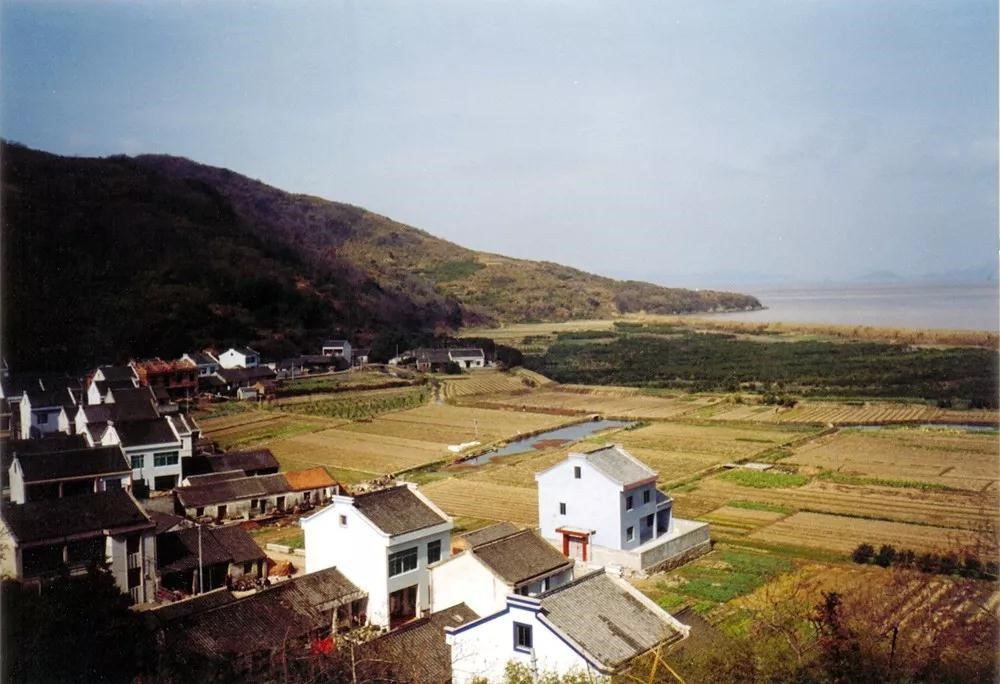
Daxie Island in the 1990s
Other Local Customs: Kept in the Memories of Locals
As village life has slowly been replaced with modern living, all that is left of many local customs is the memory of them in people’s minds. At the same time, other customs have changed and taken on new meaning.
For example, when my wife was a young child, on the morning of the first day of the Chinese New Year, she and other children in her village would go door to door carrying bags to collect new year’s gifts of candy, fruit and such in response to wishing the people good luck and happy new year.
In addition to this, every year there was a parade of people who played music and performed dances of the big-headed monks. In those days, the parade would go door to door throughout the village giving blessings and collecting new year’s money. Today, the tradition of children going door to door has long been only a memory of the past. But local people keep up the tradition every year of putting on a parade that includes a band, people wearing the costumes of characters of the Journey to the West and big-headed monks. During the parade, they walk through the town and apartment complexes. The difference is that today people do it more to creative a festive spirit than to make money.
Days spent with family always go by too fast. Every year is a special time with my in-laws and relatives, and we always look forward to the next time we can return home for the Spring Festival.
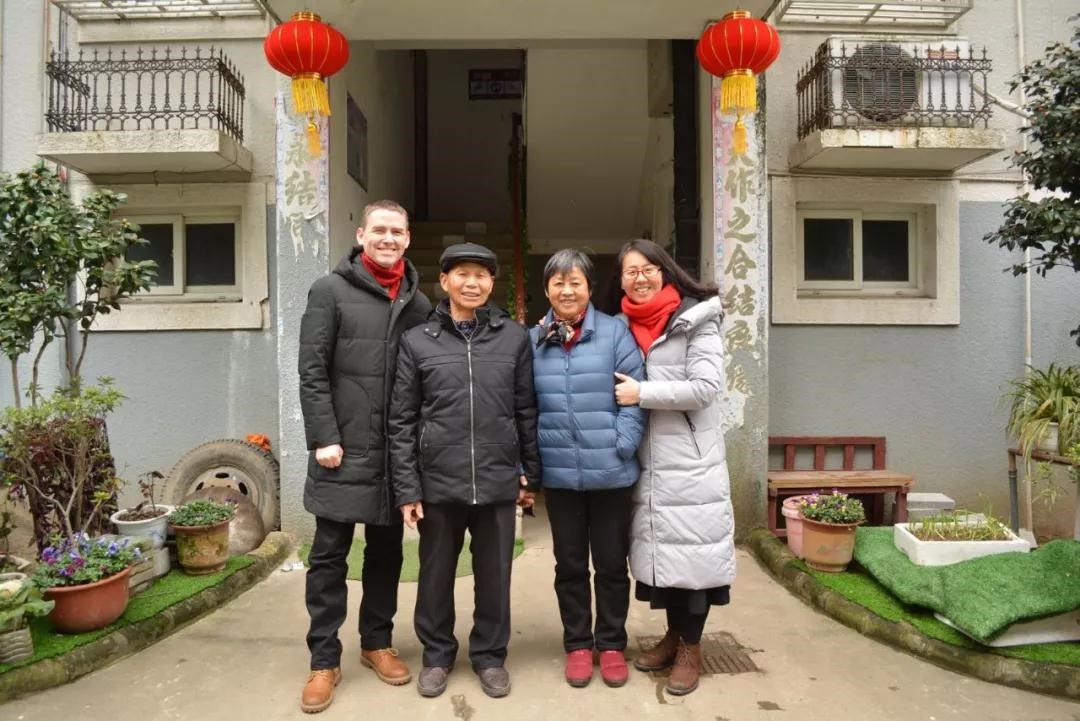
The author, his wife and parents-in-law